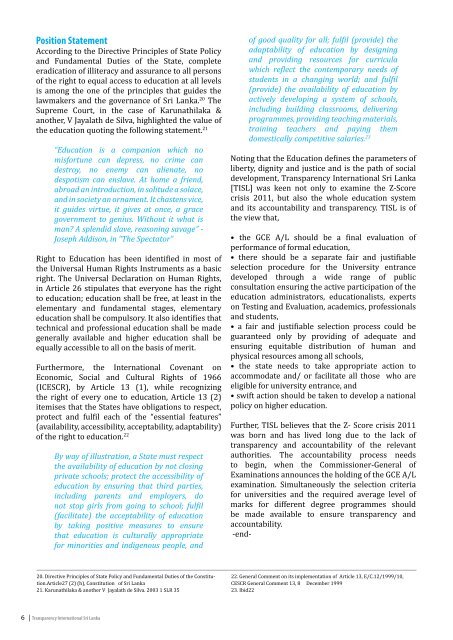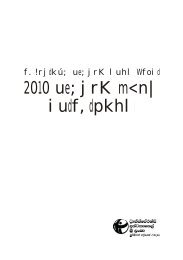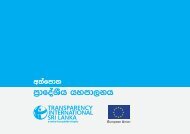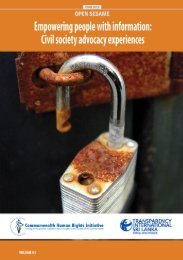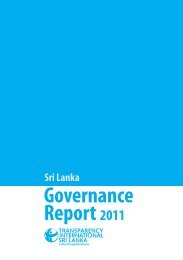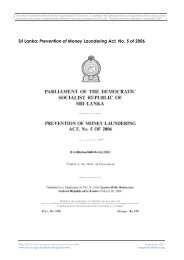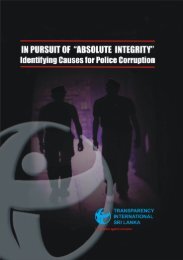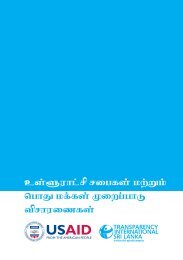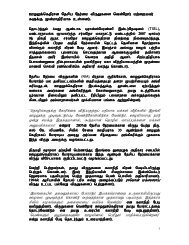Download Full Position Paper - Transparency International Sri Lanka
Download Full Position Paper - Transparency International Sri Lanka
Download Full Position Paper - Transparency International Sri Lanka
- No tags were found...
You also want an ePaper? Increase the reach of your titles
YUMPU automatically turns print PDFs into web optimized ePapers that Google loves.
<strong>Position</strong> StatementAccording to the Directive Principles of State Policyand Fundamental Duties of the State, completeeradication of illiteracy and assurance to all personsof the right to equal access to education at all levelsis among the one of the principles that guides thelawmakers and the governance of <strong>Sri</strong> <strong>Lanka</strong>. 20 TheSupreme Court, in the case of Karunathilaka &another, V Jayalath de Silva, highlighted the value ofthe education quoting the following statement. 21“Education is a companion which nomisfortune can depress, no crime candestroy, no enemy can alienate, nodespotism can enslave. At home a friend,abroad an introduction, in solitude a solace,and in society an ornament. It chastens vice,it guides virtue, it gives at once, a gracegovernment to genius. Without it what isman? A splendid slave, reasoning savage” -Joseph Addison, in “The Spectator”Right to Education has been identified in most ofthe Universal Human Rights Instruments as a basicright. The Universal Declaration on Human Rights,in Article 26 stipulates that everyone has the rightto education; education shall be free, at least in theelementary and fundamental stages, elementaryeducation shall be compulsory. It also identifies thattechnical and professional education shall be madegenerally available and higher education shall beequally accessible to all on the basis of merit.Furthermore, the <strong>International</strong> Covenant onEconomic, Social and Cultural Rights of 1966(ICESCR), by Article 13 (1), while recognizingthe right of every one to education, Article 13 (2)itemises that the States have obligations to respect,protect and fulfil each of the “essential features”(availability, accessibility, acceptability, adaptability)of the right to education. 22By way of illustration, a State must respectthe availability of education by not closingprivate schools; protect the accessibility ofeducation by ensuring that third parties,including parents and employers, donot stop girls from going to school; fulfil(facilitate) the acceptability of educationby taking positive measures to ensurethat education is culturally appropriatefor minorities and indigenous people, andof good quality for all; fulfil (provide) theadaptability of education by designingand providing resources for curriculawhich reflect the contemporary needs ofstudents in a changing world; and fulfil(provide) the availability of education byactively developing a system of schools,including building classrooms, deliveringprogrammes, providing teaching materials,training teachers and paying themdomestically competitive salaries. 23Noting that the Education defines the parameters ofliberty, dignity and justice and is the path of socialdevelopment, <strong>Transparency</strong> <strong>International</strong> <strong>Sri</strong> <strong>Lanka</strong>[TISL] was keen not only to examine the Z-Scorecrisis 2011, but also the whole education systemand its accountability and transparency. TISL is ofthe view that,• the GCE A/L should be a final evaluation ofperformance of formal education,• there should be a separate fair and justifiableselection procedure for the University entrancedeveloped through a wide range of publicconsultation ensuring the active participation of theeducation administrators, educationalists, expertson Testing and Evaluation, academics, professionalsand students,• a fair and justifiable selection process could beguaranteed only by providing of adequate andensuring equitable distribution of human andphysical resources among all schools,• the state needs to take appropriate action toaccommodate and/ or facilitate all those who areeligible for university entrance, and• swift action should be taken to develop a nationalpolicy on higher education.Further, TISL believes that the Z- Score crisis 2011was born and has lived long due to the lack oftransparency and accountability of the relevantauthorities. The accountability process needsto begin, when the Commissioner-General ofExaminations announces the holding of the GCE A/Lexamination. Simultaneously the selection criteriafor universities and the required average level ofmarks for different degree programmes shouldbe made available to ensure transparency andaccountability.-end-20. Directive Principles of State Policy and Fundamental Duties of the Constitution.Article27(2) (h), Constitution of <strong>Sri</strong> <strong>Lanka</strong>21. Karunathilaka & another V Jayalath de Silva. 2003 1 SLR 3522. General Comment on its implementation of Article 13, E/C.12/1999/10,CESCR General Comment 13, 8 December 199923. Ibid226 | <strong>Transparency</strong> <strong>International</strong> <strong>Sri</strong> <strong>Lanka</strong>


